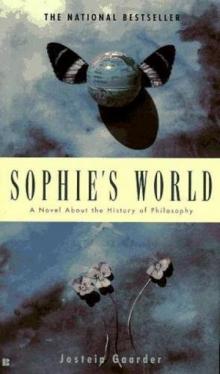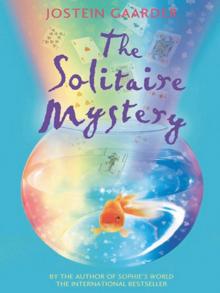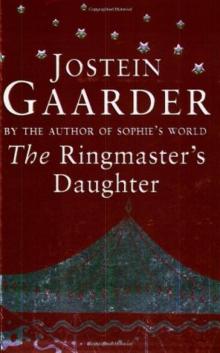- Home
- Jostein Gaarder
The Solitaire Mystery
The Solitaire Mystery Read online
Praise for Sophie’s World
‘A marvellously rich book. Its success boils down to something quite simple – Gaarder’s gift for communicating ideas’ Guardian
‘An Alice in Wonderland for the 90s . . . already Sophie’s World is being talked up as philosophy’s answer to Stephen Hawking’s A Brief History of Time . . . this is a simply wonderful, irresistible book’ Daily Telegraph
‘Remarkable . . . what Jostein Gaarder has managed to do is condense 3000 years of thought into 400 pages; to simplify some extremely complicated arguments without trivialising them . . . Sophie’s World is an extraordinary achievement’ Sunday Times
‘Challenging, informative and packed with easily grasped, and imitable, ways of thinking about difficult ideas’
Independent on Sunday
‘Sophie’s World is a whimsical and ingenious mystery novel that also happens to be a history of philosophy . . . What is admirable in the novel is the utter unpretentiousness of the philosophical lessons . . . which manages to deliver Western philosophy in accounts that are crystal clear’ Washington Post
‘A terrifically entertaining and imaginative story wrapped round its tough, thought-provoking philosophical heart’ Daily Mail
‘Seductive and original . . . Sophie’s World is, as it dares to congratulate itself, “a strange and wonderful book”’ TLS
Jostein Gaarder was a teacher for many years before he began to write full-time. He lives in Oslo with his wife. They have two grown-up sons.
By Jostein Gaarder
The Castle in the Pyrenees
The Orange Girl
The Ringmaster’s Daughter
Maya
Vita Brevis
Hello? Is Anybody There?
Through a Glass, Darkly
The Christmas Mystery
Sophie’s World
The Solitaire Mystery
The Frog Castle
The Solitaire Mystery
JOSTEIN GAARDER
Illustrations by
Hilda Kramer
Translated by
Sarah Jane Hails
A WEIDENFELD AND NICOLSON EBOOK
First published in Great Britain in 1996 by Phoenix House
This ebook first published in 2010 by Orion Books
Published be arrangement with Farrar, Straus & Giroux Inc.,
18 West 18th Street, New York, NY 10011
Originally published in Norwegian under the title Kabalmysteriet,
Copyright © H. Aschehoug & Co (W. Nygaard), Oslo 1990
Copyright © Jostein Gaarder 1990
English translation © Sarah Jane Hails 1996
The moral right of Jostein Gaarder to be identified as the author
of this work has been asserted in accordance with the
Copyright, Designs and Patents Act 1988.
All rights reserved. No part of this publication may be reproduced, stored in a retrieval system or transmitted in any form or by any means, without the prior permission in writing of the publisher, nor to be otherwise circulated in any form of binding or cover other than that in which it is published without a similar condition, including this condition, being imposed on the subsequent purchaser.
All characters and events in this publication are fictitious and any resemblance to real persons, living or
dead, is purely coincidental.
A CIP catalogue record for this book
is available from the British Library.
ISBN: 978 0 2978 6406 6
The Orion Publishing Group Ltd
Orion House
5 Upper Saint Martin’s Lane
London WC2H 9EA
An Hachette UK Company
www.orionbooks.co.uk
CONTENTS
Cover
Title
Copyright
Praise
About the Author
By Jostein Gaarder
SPADES
ACE OF SPADES
… German soldier came cycling along the country road…
TWO OF SPADES
… God is sitting in heaven laughing because people don’t believe in Him…
THREE OF SPADES
… a little strange to decorate the forest floor so far away from people…
FOUR OF SPADES
… what I held in my hands was a little book…
FIVE OF SPADES
… I heard the old man walking around in the attic …
SIX OF SPADES
… a drink which is more than a thousand times better…
SEVEN OF SPADES
… a mysterious planet …
EIGHT OF SPADES
… like a whirlwind from foreign lands …
NINE OF SPADES
… he saw peculiar things that everyone else was blind to …
TEN OF SPADES
… like distant islands I would never reach under this boat’s sail …
JACK OF SPADES
… like polished chestnuts …
QUEEN OF SPADES
… these butterflies made a sound like birdsong …
KING OF SPADES
… close encounter of the fourth kind …
CLUBS
ACE OF CLUBS
… exactly the same figures you’d find on playing cards …
TWO OF CLUBS
… He waved two tickets in the air …
THREE OF CLUBS
… a bit of a threesome …
FOUR OF CLUBS
… one huge lottery where only the winning tickets are visible …
FIVE OF CLUBS
… it had already become a bit difficult to play cards …
SIX OF CLUBS
… as though he had to make sure I was a real human being made of flesh and blood …
SEVEN OF CLUBS
… that enamel and ivory grew in my mouth …
EIGHT OF CLUBS
… if our brain was simple enough for us to understand it …
NINE OF CLUBS
… a sweet juice which glitters and tastes mildly sparkling or fizzy …
TEN OF CLUBS
… I couldn’t understand how something could just grow out of nothing …
JACK OF CLUBS
… if the world is a magic trick, then there must be a great magician, too …
QUEEN OF CLUBS
… could at least have signed the masterpiece before He took off …
KING OF CLUBS
… he thought it was downright annoying that he didn’t know more about life and the world …
JOKER
… He stole into the village like a poisonous snake …
DIAMONDS
ACE OF DIAMONDS
… a fair man who wanted all the cards on the table …
TWO OF DIAMONDS
… Old master receives important message from the homeland …
THREE OF DIAMONDS
… She was drawn here by her own reflection …
FOUR OF DIAMONDS
… Her little hand was as cold as the morning dew …
FIVE OF DIAMONDS
… the unfortunate thing was that the drink I was given actually tasted sweet and good …
SIX OF DIAMONDS
… now and then they climbed down to mingle with the people. …
SEVEN OF DIAMONDS
… a big party where the guests had been told to turn up as playing cards …
EIGHT OF DIAMONDS
… We are conjured up and tricked away …
NINE OF DIAMONDS
… we are all part of the same family …
TEN OF DIAMONDS
… a little figure peeping out from behind a newspaper stand …
JACK OF DIAMON
DS
… any vanity Dad had was associated with being a joker …
QUEEN OF DIAMONDS
… And then the little clown broke down and cried …
KING OF DIAMONDS
… we had to wear a bell around our necks …
HEARTS
ACE OF HEARTS
… when I turned the card over, I saw that it was the Ace of Hearts …
TWO OF HEARTS
… She is probably standing on a wide beach looking out over the sea …
THREE OF HEARTS
… a woman who was all dressed up and wearing a wide-brimmed hat …
FOUR OF HEARTS
… we don’t know who is dealing the cards either …
FIVE OF HEARTS
… Now I needed to have nerves of steel and not to count my chickens before they hatched …
SIX OF HEARTS
… as real as the sun and the moon …
SEVEN OF HEARTS
… The sticky-bun man shouts down a magic funnel …
EIGHT OF HEARTS
… such a fantastic miracle that it’s hard to know whether to laugh or cry …
NINE OF HEARTS
… the world is not mature enough to hear about Frode’s playing cards …
TEN OF HEARTS
… there is a fool walking the earth who is never ravaged by time …
JACK OF HEARTS
… a little man rummaging around in the back seat …
QUEEN OF HEARTS
… then suddenly an elderly lady came out of the old pub …
KING OF HEARTS
… the memories float further and further away from that which once created them …
In This Story You Will Meet
Hans Thomas, who reads the sticky-bun book on his way to the philosophers’ homeland
Dad, who grew up in Arendal as the illegitimate child of a German Soldier, before running away to become a sailor
Mama, who has lost herself in the fashion world
Line, who is Hans Thomas’s grandma
Grandpa, who was sent to the eastern front in 1944
The dwarf, who gives Hans Thomas a magnifying glass
A fat lady in the pub in Dorf
The old baker, who gives Hans Thomas a fizzy drink and four sticky buns in a paper bag
A fortune-teller and her extremely beautiful daughter, an American lady who splits herself in two, a Greek fashion agent, a Russian brain researcher, Socrates, King Oedipus, Plato, and a talkative waiter
In The Sticky-Bun Book You Will Also Meet
Ludwig, who came over the mountains to Dorf in 1946
Albert, who grew up as an orphan after his mother died
Baker Hans, who was shipwrecked in 1842 on his way from Rotterdam to New York, before he settled down as a baker in Dorf
Frode, who was shipwrecked with a large cargo of silver in 1790 en route from Mexico to Spain
Stine, who was engaged to Frode and was pregnant when he left for Mexico
The farmer Fritz André and the storekeeper Heinrich Albrechts 52 playing cards, including the Ace of Hearts, the Jack of Diamonds, and the King of Hearts
The Joker, who sees too deeply and too much
Six years have passed since I stood in front of the ruins of the ancient Temple of Poseidon at Cape Sounion and looked out across the Aegean Sea. Almost one and a half centuries have passed since Baker Hans arrived on the strange island in the Atlantic Ocean. And exactly two hundred years have passed since Frode was shipwrecked on his way from Mexico to Spain.
I have to go that far back in time to understand why Mama ran away to Athens…
I would really like to think about something else. But I know I have to try to write everything down while there is still something of a child in me.
I am sitting by the living-room window at Hisøy, watching the leaves drift from the trees outside. The leaves sail down through the air and come to rest like a loose carpet on the street. A little girl wades through the horse chestnuts, which bounce and scatter between the garden fences.
It’s as though nothing fits together any more.
When I think about Frode’s playing cards, it’s as though all nature has come apart at the seams.
ACE OF SPADES
… a German soldier came
cycling along the country road …
The great journey to the homeland of the philosophers began in Arendal, an old shipping town on the south coast of Norway. We took the ferry, the Bolero, from Kristiansand to Hirtshals. I’m not going to say much about the trip down through Denmark and Germany, because apart from Legoland and the large dock area in Hamburg, we saw little more than highways and farms. It was only when we got to the Alps that things really began to happen.
Dad and I had a deal: I wasn’t supposed to complain if we had to drive a long time before stopping for the night, and he wasn’t allowed to smoke in the car. In return, we agreed to make lots of cigarette stops. These cigarette stops are what I remember most clearly from the time before we reached Switzerland.
The cigarette stops always began with Dad giving a little lecture about something he’d been thinking about while he’d been driving and I’d been reading comics or playing solitaire in the back seat. More often than not, his lecture had something to do with Mama. Otherwise, he would go on about stuff which had fascinated him for as long as I’d known him.
Ever since Dad had returned from his life at sea, he had been interested in robots. Maybe that in itself wasn’t so strange, but with Dad it didn’t end there. He was convinced that one day science would be able to create artificial people. By this, he didn’t just mean those dumb metal robots with red and green flashing lights and hollow voices. Oh no, Dad believed that science would one day be able to create real thinking human beings, like us. And there was more – he also believed that, fundamentally, human beings are artificial objects.
‘We are dolls bursting with life,’ he would say.
This sort of declaration often came after a little drink or two.
When we were in Legoland, he stood and stared at all the Lego people. I asked him if he was thinking about Mama, but he just shook his head.
‘Just imagine if all this suddenly came alive, Hans Thomas,’ he said. ‘Imagine if these figures suddenly began to toddle around among the plastic houses. What would we do then?’
‘You’re crazy,’ was all I could say. I was sure this kind of statement wasn’t normal for fathers who took their children to Legoland.
I was about to ask for an ice cream. You see, I had learned that it was best to wait until Dad started to air his odd ideas before asking for something. I think he occasionally felt guilty for going on about things like this with his son, and when you feel guilty, you tend to be a little more generous. Just as I was about to ask for the ice cream, he said, ‘Basically, we ourselves are such live Lego figures.’
I knew the ice cream was a sure thing now, because Dad was about to philosophise.
We were going all the way to Athens, but we weren’t on a normal holiday. In Athens – or at least somewhere in Greece – we were going to try to find Mama. It wasn’t certain that we’d find her, and even if we did find her, it wasn’t certain she’d want to come home with us to Norway. But Dad said we had to try, because neither he nor I could bear the thought of living the rest of our lives without her.
Mama ran away from Dad and me when I was four years old. That’s probably why I still call her Mama. Gradually Dad and I got to know each other better, and one day it just didn’t seem right to call him Daddy any more.
Mama went out into the world to find herself. Both Dad and I realised that it was about time you found yourself if you’d managed to become the mother of a four-year-old boy, so we supported the actual project. I just could never understand why she had to go away to find herself. Why couldn’t she sort things out at home, in Arendal – or at least be satisfied with a trip to Kristiansand? My advice to all those who are going to fin
d themselves is: stay exactly where you are. Otherwise you are in great danger of losing yourself for ever.
So many years had passed since Mama left us that I couldn’t really remember what she looked like. I just remembered that she was more beautiful than any other woman. At least that’s what Dad used to say. He also believed that the more beautiful a woman is, the more difficulty she has finding herself.
I had been searching for Mama from the moment she disappeared. Every time I walked across the market square in Arendal, I thought I might suddenly see her, and every time I was in Oslo visiting Grandma, I looked for her along Karl Johan Street. But I never saw her. I didn’t see her until Dad came in one day holding up a Greek fashion magazine. There was Mama – both on the cover and inside the magazine. It was pretty obvious from the pictures that she still hadn’t found herself, because these were not pictures of my Mama: she was clearly trying to look like somebody else. Both Dad and I felt extremely sorry for her.
The fashion magazine had found its way to us after Dad’s aunt had been to Crete. There, the magazine with the pictures of Mama had been hung up on all the newspaper stands. All you had to do was toss a few drachmas on the counter, and the magazine was yours. I thought it was almost comical. We had been looking for Mama for years, while all the time she’d been down there posing and smiling to all the passersby.
‘What the hell has she gone and got herself mixed up in?’ Dad asked, scratching his head. Nevertheless, he cut out the pictures of her and stuck them up in his bedroom. He thought it was better to have pictures of someone who looked like Mama than to have none at all.
That was when Dad decided we had to go to Greece and find her.
‘We must try to tow her home again, Hans Thomas,’ he said. ‘Otherwise, I’m afraid she may drown in this fashion fairy tale.’

 Sophie's World: A Novel About the History of Philosophy
Sophie's World: A Novel About the History of Philosophy The Solitaire Mystery
The Solitaire Mystery The Ringmaster's Daughter
The Ringmaster's Daughter The Christmas Mystery
The Christmas Mystery Sophie's World
Sophie's World